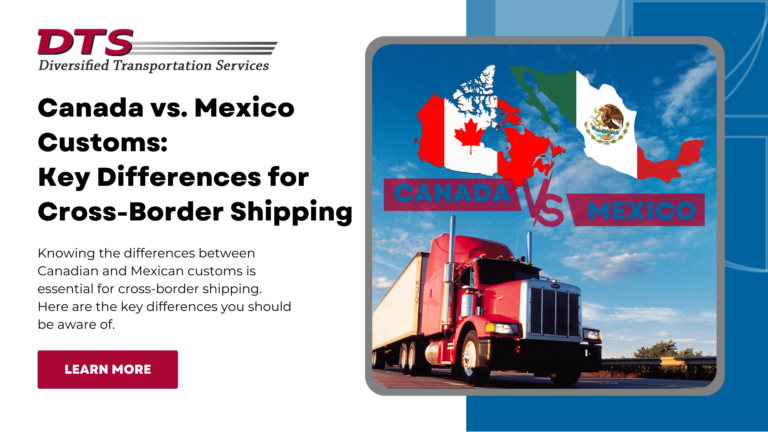
Understanding the differences between Mexican and Canadian customs is crucial if you plan to do any cross-border shipping. When moving goods between countries, even minor oversights can disrupt your operations and lead to costly delays. The better you prepare for cross-border transportation, the smoother the process will be.
In this post, we’ll look at the similarities and differences between Canadian and Mexican customs to help you with successful cross-border shipping.
Here are some of the ways customs are similar in Canada and Mexico:
The United States-Mexico-Canada Agreement (USMCA) took effect on July 1, 2020, replacing the older North American Free Trade Agreement (NAFTA), which had been in place since 1992.
The USMCA is a free trade agreement intended to create a more balanced trade situation for all relevant parties (including businesses, ranchers, and farmers) and to cultivate the growth of the North American economy. It does this by creating a free trade zone with no or limited customs duties between the US, Mexico, and Canada.
Importing goods to both Canada and Mexico requires clearing those goods with customs. Without clearance, cross-border freight will not be allowed into either country. The customs clearance process is different in each country — more on that below.
Here are some of the differences between the Canadian and Mexican customs systems.
Getting the paperwork right is a must for efficient cross-border transportation. The documentation involved in Canada's and Mexico's logistics differs significantly — here’s what you need to know.
One of the most important things you’ll need for shipping to or through Mexico is a Mexican Import Request (Pedimento de Importación) document. This must be completed for all commercial cross-border shipping.
You’ll also be expected to supply a certificate of origin which confirms the goods’ nationality. This is required for all shipments worth more than US$2,500 imported into the US and for shipments worth more than US$1,000 exported to Mexico.
Other key documents required include:
Essential documentation for Canada cross-border transportation includes:
Here are the differences when it comes to insurance:
By law, Mexican carriers do not need to have cargo insurance, and most don’t carry it even though cargo theft is common.
Canadian carriers must have minimum cargo insurance limits and third-party liability. Some brokers may also offer additional insurance for your peace of mind.
Transloading (transferring freight between trailers at the border) is common when importing goods to Mexico or exporting them to the US. This practice is due to the stringent B-1 visa requirements in Mexico, though more Mexican carriers have drivers with B-1 visas today.
Since Canadian drivers typically don’t need a B-1 visa, most cross-border shipments in Canada are through-trailer shipments, meaning they’re hauled by the same person instead of being switched at the border.
The time it takes to ship into Canada versus Mexico from the US can vary significantly.
Crossing the Mexican border can take much longer (up to five hours) than getting into Canada. The main reasons for this delay include:
Crossing the Canadian border from the US typically takes less than one hour. Canada and the US have more border crossing locations, more advanced technology supporting their customs system, and no language barrier, which helps speed things along.
For example, Canada’s Pre-Arrival Review System (PARS) lets importers submit information about their cargo to the Canada Border Services Agency (CBSA for review and processing before their cargo arrives at the Canadian border.
Check out our blog post to learn more about how Canada’s Pre-Arrival Review System works.
These are just a few differences between importing and exporting goods into Canada and Mexico. But keeping track of all these details can take lots of time and energy — taking you away from running your business.
That’s why getting help from a shipping logistics company is a good idea. Working with a shipping logistics company will make cross-border shipping simple and easy for your business.
DTS is a dedicated global shipping logistics company with more than 32 years of experience. To find out how we can help you transport your cross-border freight efficiently, get in touch today.
Whether you're a company looking to improve one facet of your supply chain, your entire supply chain, or simply looking for a transportation and logistics consultation, we can help.